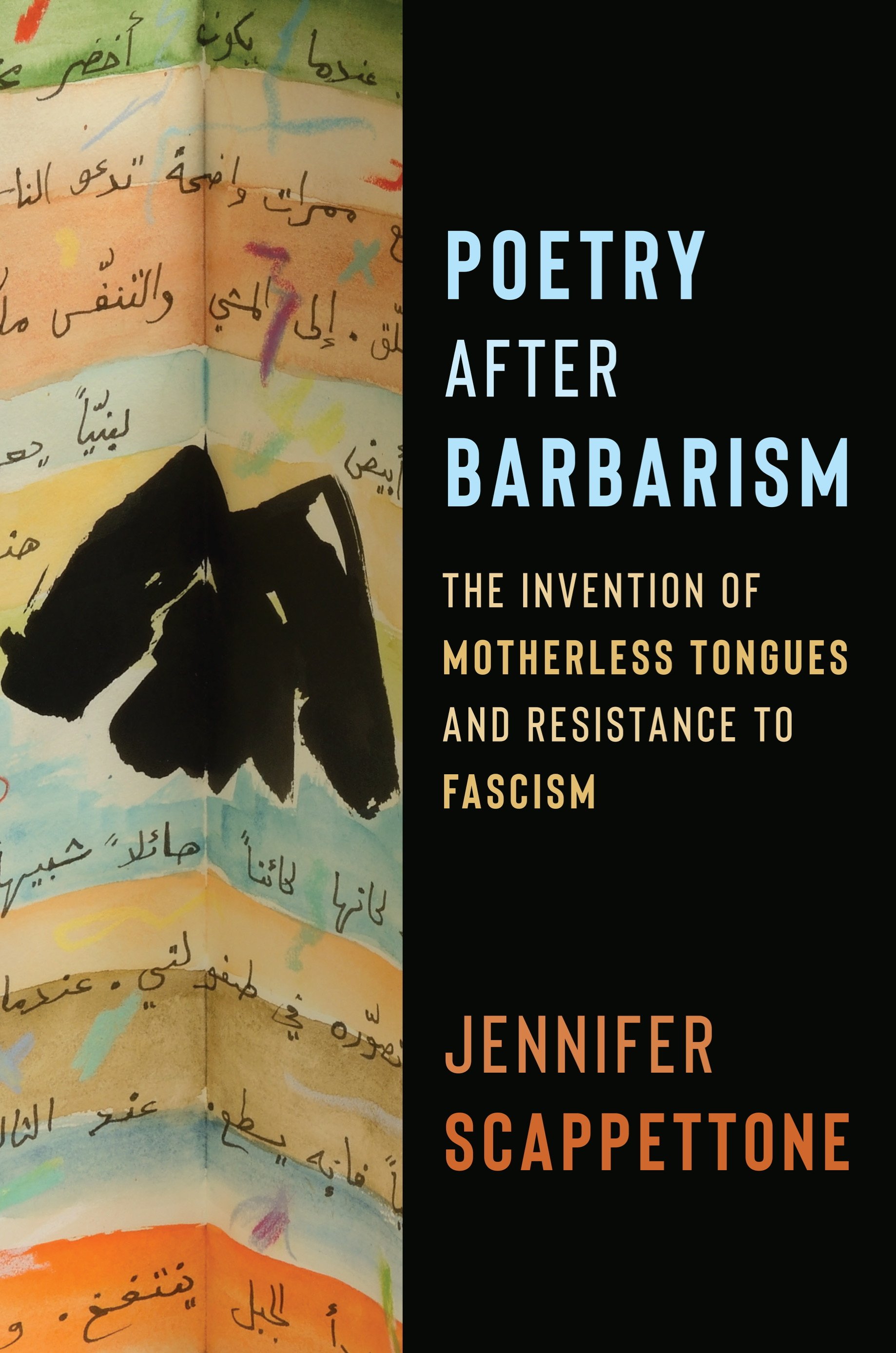Against a backdrop of xenophobic and ethnonationalist fantasies of linguistic purity, Poetry After Barbarism: The Invention of Motherless Tongues and Resistance to Fascism (Columbia University Press, 2025) uncovers a stateless, polyglot poetry of resistance—the poetry of motherless tongues. Departing from the national and global paradigms that dominate literary history, Jennifer Scappettone traces the aesthetic and geopolitical resonance of “xenoglossic” poetics: poetry composed in the space of contestation between national languages, concretizing dreams of mending the ruptures traced to the story of Babel. As global migration, aerial bombardment, and the wireless telegraph shrank distances with brute force during the twentieth century, visions of transcultural communication emerged in the hopes of bridging linguistic difference. At the same time, evolving Fascist ideologies denied the reality of cultural admixture and the humanity of the stranger.
Authors who write xenoglossic verse occupy languages without a perceived birthright or sanctioned education; they compose in ecstatic “orphan tongues” that rebuff nationalist ideologies, on the one hand, and globalization, on the other, uprooting notions of belonging ensconced in nativist metaphors of milk, blood, and soil while rendering the reactionary category of the barbarian obsolete. Raised within or in the wake of fascism, these poets practice strategic forms of literary and linguistic barbarism, proposing modes of collectivity that exceed geopolitical definitions. Studying experiments between languages by immigrant, refugee, and otherwise stateless authors—from Baroness Elsa von Freytag-Loringhoven to Emilio Villa, Amelia Rosselli, Etel Adnan, LaTasha N. Nevada-Diggs, Chika Sagawa, and Sawako Nakayasu—this book explores how poetry can both represent and jumpstart metamorphosis of the shape and sound of citizenship, modeling paths toward alternative republics in which poetry might assume a central agency.
In Poetry After Barbarism, Jennifer Scappettone argues for nomadic, miscegenated, “xenoglossic” poetries as fierce forms of linguistic and political resistance. Prodigiously researched cross-cultural readings celebrate a stellar constellation of consequential poets: Emilio Villa, Amelia Rosselli, Elsa von Freytag-Loringhoven, Etel Adnan, and LaTasha N. Nevada Diggs.
Charles Bernstein, author of The Kinds of Poetry I Want: Essays and Comedies
Scappettone gathered a queer family of literary orphans to found a pentecostal, radically stateless poetic nation: a new tradition built on undoing empire, unlearning mastery, and lighting a path through the ruins of fascist aesthetics. In a time of recrudescence, her scholarship shows us that xenoglossia and poetry are not reactions or responses, but rather alternatives to fascism.
Alessandro Giammei, Department of Italian Studies, Yale University
Poetry After Barbarism, the expression of fourteen years of passionately heteroglossic scholarship, is truly a handbook for the joyous resistance. "Syncretism can only truthfully come to fruition in tumult," Scappettone writes of the wild lexicographer Emilio Villa’s homoerotic experiments in borderless etymology and liquid tableware, of the milkdresses of Filippo Tommaso Marinetti, of the radio conductive junkjewels of Baroness Elsa von Freytag-Loringhoven, of the panmusical metavulgate of Amelia Rosselli, of the radical pentacosticism of LaTasha N. Nevada Diggs, of the discomposed cartography of m. nourbeSe philip. In her delicately robust readings Scappettone untethers identity from territory in favor of a translingual proposition—that tumult’s time is now.
Lisa Robertson, author of The Baudelaire Fractal and Nilling
Xenoglossia, as illuminating critical theory and resistant, liberatory poetic practice, feels especially appropriate for our current moment of rising authoritarianism, nationalism and fascism, and Jennifer Scappettone provides an excellent guide through her rigorous, nuanced readings in Poetry After Barbarism. Brimming with insight, politically aware, and written with verve, this is one study that will be as useful to fellow scholars as to poets and other artists in charting a path forward to the future.
John Keene, Distinguished Professor of English and Africana Studies, Rutgers University-Newark
"Scappettone offers the ultimate rejoinder to both Auerbach and Said. To her, it is not enough that our philological home is the earth. In fact, our language—our home—must also be planetary and cosmic, escaping the entrapments that make an internationalized earth just another vestige of the state…. Escaping Babel’s haunt, it’s possible to see—xenoglossically—our bodies, our histories, our languages as complete in themselves. The task remains, then, to extend care, humanity, solidarity, and life, to tongues—and people—outside of the trajectories inscribed by our protos; to raze the language tree that dictates our cultural debt and our naturalized nations; and to reinvest in living with, and living for, difference."
Aditi Rao, Public Books
“The Pentecostal xenoglossic poetry that emerges from the mouths of the unstudied and inspired is 'disfluent', Scappettone argues, 'contrary to the satisfying hermeneutic game of multilingual modernist monuments', it is eccentric, 'impossibly bizarre, opaque, and shrouded to hermeneutics' (16). The xenoglossic poem dares to sound wrong, to fall on critical ears, patches itself together out of the languages of the marginalised, and though condemned to non-standard, stateless wandering as discourse, is free of the nationalist and reactionary politics of the mother tongue.… Poetry After Barbarism is itself an exercise in disfluency, advocating these difficult and between-states/stateless voices with scholarly attentioin that is animated by a fellow-poet's political passion and compassion for the peoples under subjection; yet as passionately celebrating the energy, vitality, joyful making that emerges as the xenoglossia sings, laments, plays and enjoys the pentecostal differences on the tongue.”
Adam Piette, Blackbox Manifold
